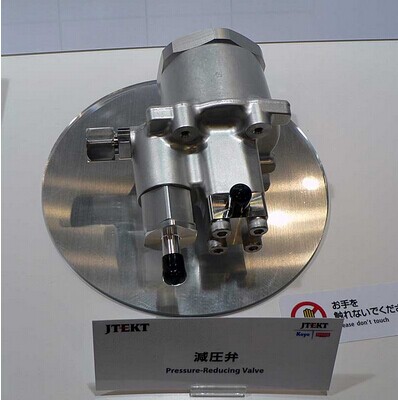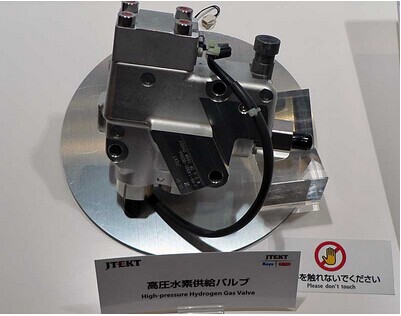JTKET shows Hydrogen Gas Valve, Regulator of Mirai FCV
 For the valve, a tapered cylinder moves in and out of a cylindrical ring. When the tapered part touches the ring, the valve is closed. For the movement of the cylinder, the electromagnetic solenoid is used.
For eliminating leakage, it is necessary to increase the concentricity of the parts of the valve and reduce surface roughness as much as possible. However, no matter how accurately they were made, small gaps were made, leaking hydrogen.
Therefore, Jtekt employed a structure that fills the small gaps by using the elastic deformation of the valve. While a hard material improves the abrasion resistance of the valve, it makes the valve difficult to deform. It was difficult to attain a proper balance, the company said. The Mirai is equipped with two high-pressure hydrogen tanks, and each of them has this valve.
For the valve, a tapered cylinder moves in and out of a cylindrical ring. When the tapered part touches the ring, the valve is closed. For the movement of the cylinder, the electromagnetic solenoid is used.
For eliminating leakage, it is necessary to increase the concentricity of the parts of the valve and reduce surface roughness as much as possible. However, no matter how accurately they were made, small gaps were made, leaking hydrogen.
Therefore, Jtekt employed a structure that fills the small gaps by using the elastic deformation of the valve. While a hard material improves the abrasion resistance of the valve, it makes the valve difficult to deform. It was difficult to attain a proper balance, the company said. The Mirai is equipped with two high-pressure hydrogen tanks, and each of them has this valve.
 On the other hand, the Mirai uses one regulator whose valve has a similar structure and balanced by a spring. The spring is adjusted so that the pressure in the pressure chamber connected to fuel cells becomes about 1MPa. When the pressure lowers to less than 1MPa, the spring is compressed and the regulator (valve) is opened, supplying hydrogen from the high-pressure tank. When the pressure increases to higher than 1MPa, the regulator is closed. The housing and valve are made of aluminum alloy and steel, respectively.
On the other hand, the Mirai uses one regulator whose valve has a similar structure and balanced by a spring. The spring is adjusted so that the pressure in the pressure chamber connected to fuel cells becomes about 1MPa. When the pressure lowers to less than 1MPa, the spring is compressed and the regulator (valve) is opened, supplying hydrogen from the high-pressure tank. When the pressure increases to higher than 1MPa, the regulator is closed. The housing and valve are made of aluminum alloy and steel, respectively.
1.The news above mentioned with detailed source are from internet.We are trying our best to assure they are accurate ,timely and safe so as to let bearing users and sellers read more related info.However, it doesn't mean we agree with any point of view referred in above contents and we are not responsible for the authenticity. If you want to publish the news,please note the source and you will be legally responsible for the news published.
2.All news edited and translated by us are specially noted the source"CBCC".
3.For investors,please be cautious for all news.We don't bear any damage brought by late and inaccurate news.
4.If the news we published involves copyright of yours,just let us know.
Next Aug 17 Bearing Steel Price in Different Regions of China
BRIEF INTRODUCTION
Cnbearing is the No.1 bearing inquiry system and information service in China, dedicated to helping all bearing users and sellers throughout the world.
Cnbearing is supported by China National Bearing Industry Association, whose operation online is charged by China Bearing Unisun Tech. Co., Ltd.
China Bearing Unisun Tech. Co., Ltd owns all the rights. Since 2000, over 3,000 companies have been registered and enjoyed the company' s complete skillful service, which ranking many aspects in bearing industry at home and abroad with the most authority practical devices in China.





